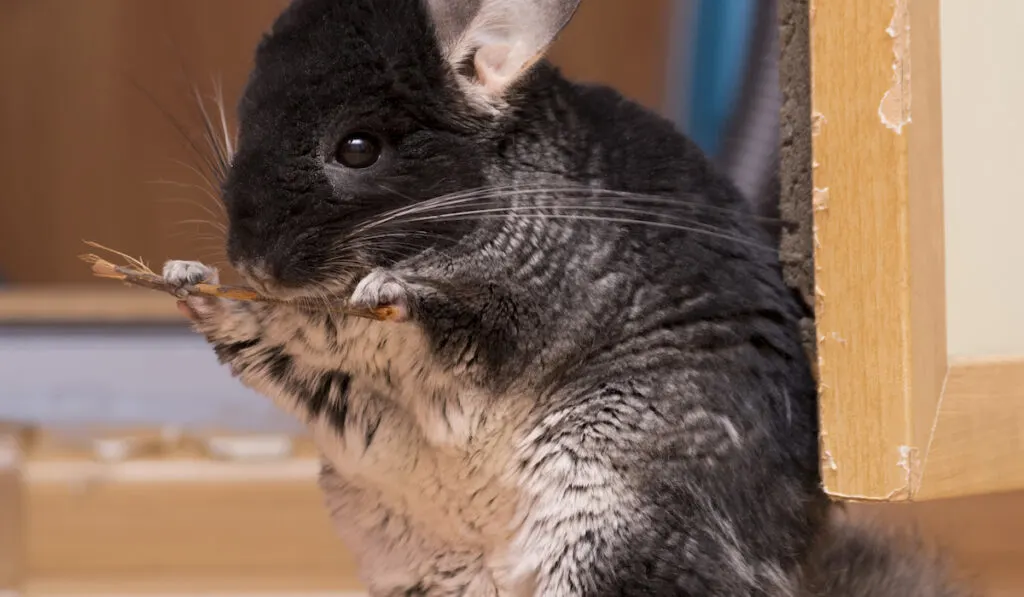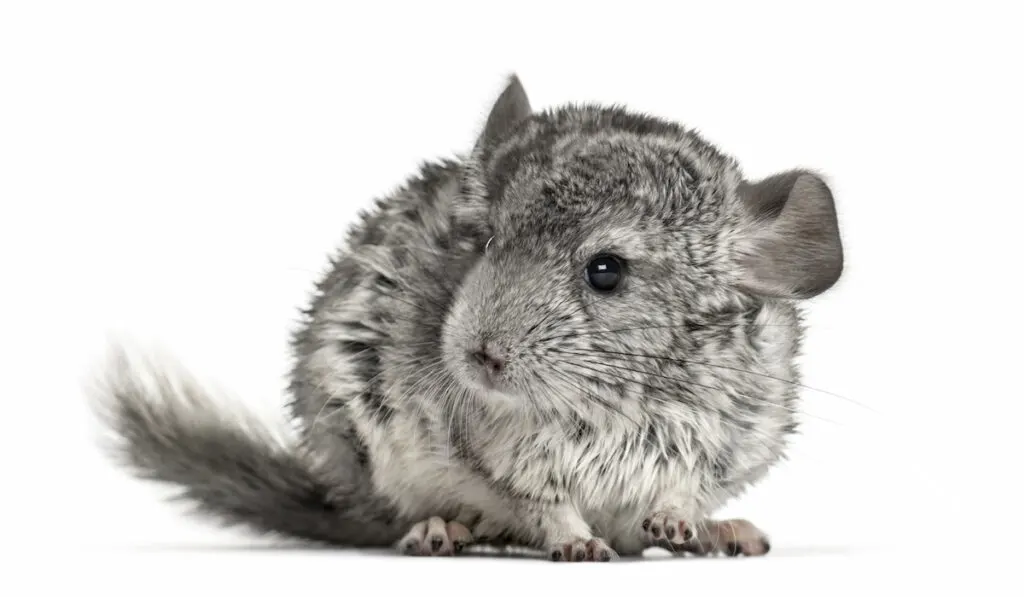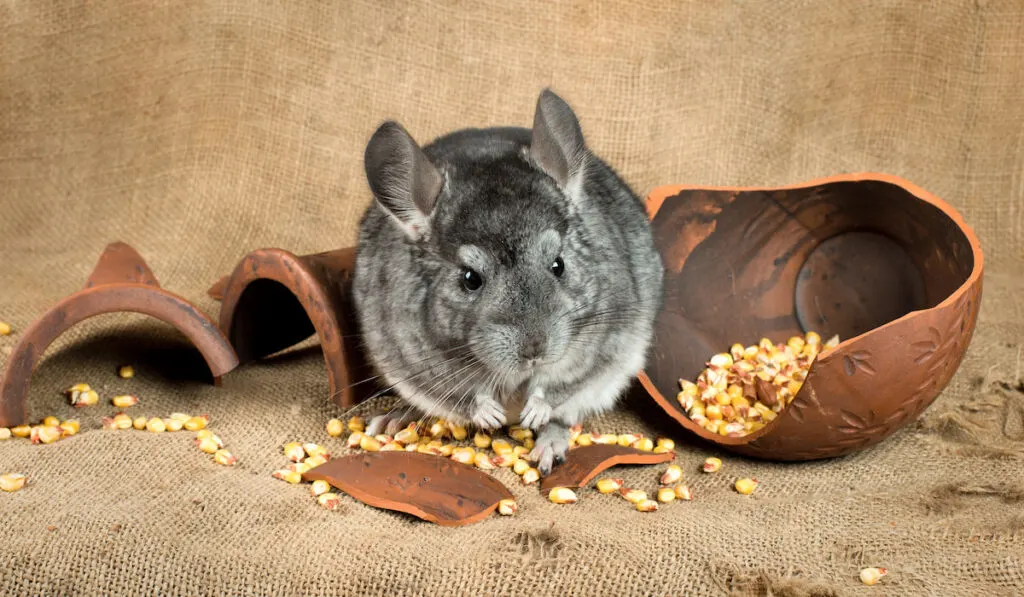If you are in the market for a pet and want to branch out to something other than cats or dogs, a chinchilla is an option you may want to consider. Chinchillas are extremely cute and have been known for their exceptionally soft pelts long before their value as household pets was recognized. But since they are not as popular as cats and dogs, they must have drawbacks, right?
Do chinchillas smell?
No, chinchillas do not smell. A healthy chinchilla is a clean, odorless pet. Any stench or strange odor coming from your chinchilla’s cage is likely due to a sick chinchilla or negligence in cage cleaning on the part of the owner.

While it is unlikely that your chinchilla smells, there are several things you should know about proper care for your chinchilla that can help you ensure that your pet is healthy and that it is living in the best possible conditions for a long and happy life.
Table of Contents
Do Chinchillas Smell Bad?
Chinchillas do not smell bad. They are a very clean and odorless pet. However, if you are unaware of proper care and maintenance for your chinchilla and do not pay attention to some warning signs, there are some conditions that could cause your chinchilla to start stinking.
What Causes a Chinchilla to Smell Bad?
There are several scenarios in which your clean, odorless chinchilla may start giving off an unpleasant scent.
Poor Dental Hygiene
Just like humans, dogs, or any other mammals, good dental hygiene in your chinchilla is one of the first steps in health.
Chinchillas’ teeth keep growing throughout their lives so any crooked, missing, or chipped teeth can lead to spacing problems that will become problematic down the road, such as teeth that grow into the soft tissue of the mouth.

This will cause your chinchilla a great deal of pain and make it difficult for him or her to eat normally. In addition, irregular dental formations can cause food to get stuck in your chinchilla’s teeth.
Whether due to teeth growing into mouth tissue or food getting stuck in their teeth, dental problems can cause your chinchilla to have bad breath.
You will want to stay on top of your chinchilla’s dental hygiene before bad breath becomes an issue. The following are some warning signs that your chinchilla may be experiencing dental problems that could lead to bad breath:
- Excessive clicking and grinding of the teeth
- Irregular eating habits
- Drooling
- Protruding teeth
- Weight loss
If you notice any or all of these symptoms in your chinchilla, you will want to get him or her to the veterinarian to discuss ways to improve dental hygiene.
To avoid dental hygiene issues, make sure that your chinchilla has a proper chew toy in his or her cage and that you are providing him or her with a balanced diet rich in nutritious chinchilla hay (like this one ).
Wet Chinchillas
Do you ever wonder why dogs stink when wet?
This is because their fur contains tiny microorganisms, such as yeast and bacteria, that excrete stinky, volatile compounds when the dog gets wet.
Fortunately, this is not an issue with chinchillas because they do not need to get wet when cleaning themselves. In fact, due to the chinchilla’s thick, soft fur, getting a chinchilla wet is a terrible idea, as their dense fur will hold wetness and be very difficult to dry.

Not only will the damp fur heighten the likelihood that foreign particles stick to the chinchilla’s fur, leading to a foul odor, but wet chinchillas can develop fungal and/or respiratory infections. (source)
While healthy chinchillas are odorless, unhealthy chinchillas are more likely to give off a foul smell.
As such, keep your chinchilla out of the water.
To clean your chinchilla, you’ll need to learn how to give it a dust bath. This will help keep its lush, soft fur shiny and well-preserved.
The correct bathing dust can be found at any pet store and should be used three times per week to keep your chinchilla clean and healthy.
This will help prevent your chinchilla from getting sick and giving off an odor, as well as get rid of contaminants embedded in the fur that may cause the chinchilla to have a foul scent.
Dirty Cage

Chinchillas are soft, cuddly pets that are generally low maintenance and do not give off an odor.
However, one of the more time-consuming aspects of owning a chinchilla is that their cages need to be cleaned often, ideally two times per day.
While chinchilla poop and chinchilla farts do not cause an odor, chinchilla pee does have a foul stench and, if left unattended, can cause the chinchilla’s cage to smell unpleasant.
The best way to quickly and effectively clean a chinchilla’s cage is by using a liner.
A fleece liner is a great option for chinchilla cages. Not only are these liners soft and comfortable for your chinchilla to lie on, but it is easy to use a small vacuum to scoop up all of the chinchilla poop. Then, you can simply throw the fleece liner in the wash to eliminate any urine odors.

More Ideas for Avoiding a Stinky Cage
If you are not a fan of the idea of having to vacuum and do laundry to clean your chinchilla’s bedding, then there are a number of disposable liners available on the market. Although these are not as comfortable for your chinchilla, the cleaning process is a bit less time-consuming.
Using a large cage for your chinchilla is another way to prevent odor from building up. This is because even with proper cleaning and switching of liners, it is a good idea to give the chinchilla cage a more thorough cleaning about once a week.
Smaller cages are more prone to have concentrated gunk build-up, so this deep cleaning process is a bit easier with a larger cage.
Some Things to Know About Your Chinchilla
We’ve already established that healthy chinchillas are soft, lovable, and odorless creatures. However, factors such as disease or dirty cages may cause your chinchilla to give off a dirty scent.
The following are some facts about your chinchilla that you will want to cross-reference to ensure that all is right with your cuddly little pet:
Chinchillas are Naturally Active
Chinchillas are active creatures that need space to climb, scurry, and play, so you should plan your cage accordingly. They are crepuscular, meaning that they are most active at dawn and dusk.
Keeping a chinchilla too confined may keep it from being healthy, while a chinchilla that is unusually lazy may be the indication of an underlying health issue.
Chinchilla Poop is Hard and Odorless
Chinchilla poop should be in the form of hard, odorless pellets, similar to that of a rat or mouse. If your chinchilla is making poop that is overly runny, in a shape other than a pellet, or has an unpleasant stench, you will want to take him or her to the veterinarian to check for some gastrointestinal issues.
Chinchillas Will Shed
As chinchillas have such thick, dense coats, it is only natural that they will shed. However, intense periods of shedding only occur every 90 days or when the temperature becomes hotter than usual.
If you detect that your chinchilla is shedding more than usual, it is likely that he or she is not taking enough dust baths. Dust baths are essential to a chinchilla’s overall hygiene, and this includes keeping the chinchilla’s hair lush and following its normal shedding cycle.
Remember, an unhealthy chinchilla is one of the only factors that can make your chinchilla have an unpleasant stench, so be sure to monitor its shedding patterns closely.
